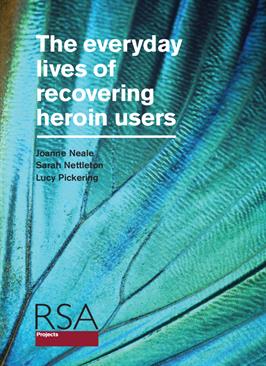The RSA Whole Person Recovery Programme hosted Professor Joanne Neale, one of the authors of 'The everyday lives of recovering heroin users'. She gave a presentation to an audience of RSA Fellows, practitioners and service users and afterwards sat down with a member of the WPR team to discuss the book, its design and its impact.
Starting the recovery journey can be a frightening and anxiety provoking prospect to many, and continuing it requires high levels of personal motivation and commitment. Yet, once embarked upon, the relief and refuge that recovery can provide is invaluable. We learn that although there are many common milestones on the road to recovery – the demands of detox, the need for support and to rebuild relationships – so too, within these categories, are journeys highly personalised and multi-dimensional in nature.
The interviews explore many aspects of recovery. One theme that emerges is the need for users to develop new social networks. The accounts in this book highlight the necessity of gaining distance from drug-using circles, which can all too often lead to relapse, and to make a new start in life with new connections, influences and opportunities. Repairing relationships with family members is also often a key part of (re-)building a support network and of relieving the feelings of shame and remorse that may arise from reflecting on past behaviour.
As people start to think about and come off heroin, there is a clear need to develop their 'recovery capital': the personal, social and wider community and cultural resources they need to support their recovery. In particular, the need for meaningful activity (including volunteering, paid work, education/training, and specific recovery activities such as fellowship meetings) comes across clearly in the interviews.
This book deepens our understanding of recovery, and provides a rich complement to the RSA's Whole Person Recovery programme. It offers insights and prompts into how we can better design services and support for those navigating their recovery journeys. As the government continues to develop its thinking and guidance about how the recovery ambitions of the 2010 national drugs strategy can be achieved, commissioners, keyworkers, peers in recovery, users thinking about recovery, and families and friends of those using drugs or in recovery would benefit from reading this book.
Interviewees' accounts clearly signal the need to design and commission services and support that take adequate account of the expansive nature of recovery, and of the time it can take to nurture its sometimes vulnerable roots. Services need to combine treatment with methods that build personalised social and economic inclusion and the wider social attitudes and behaviours that encourage and allow such inclusion.
A move to a recovery agenda presents new challenges to front line recovery workers. Staff in these positions need to give consideration to all the themes explored in this book and how they interact, and give attention to the individual details and circumstances that will help to make recovery stick and mitigate the risk of relapse.
For those contemplating starting out on their recovery journey, and for those who are some way along, the individual stories provide frank accounts of the challenges and rewards that lie ahead. I hope this book becomes a valuable reference point to those recovering from substance misuse, dispelling myths, providing encouragement, and cementing the necessary motivation, hope and resolve to recover.
Interviewees acknowledge that there is more support available now than in previous years. Our collective challenge is to sustain the gains we have made through investment in treatment (and the net benefits that expenditure has brought to individuals, wider communities and the public purse), and extend services and social support to improve the likelihood of sustainable recovery. By doing so, we will enable more recovering heroin users to feel 'normal'. As Beth, 43, says "My hopes are to be happy, without drugs or alcohol, easy as that."
pdf 2.8 MB
Contributors




Be the first to write a comment
Comments
Please login to post a comment or reply
Don't have an account? Click here to register.